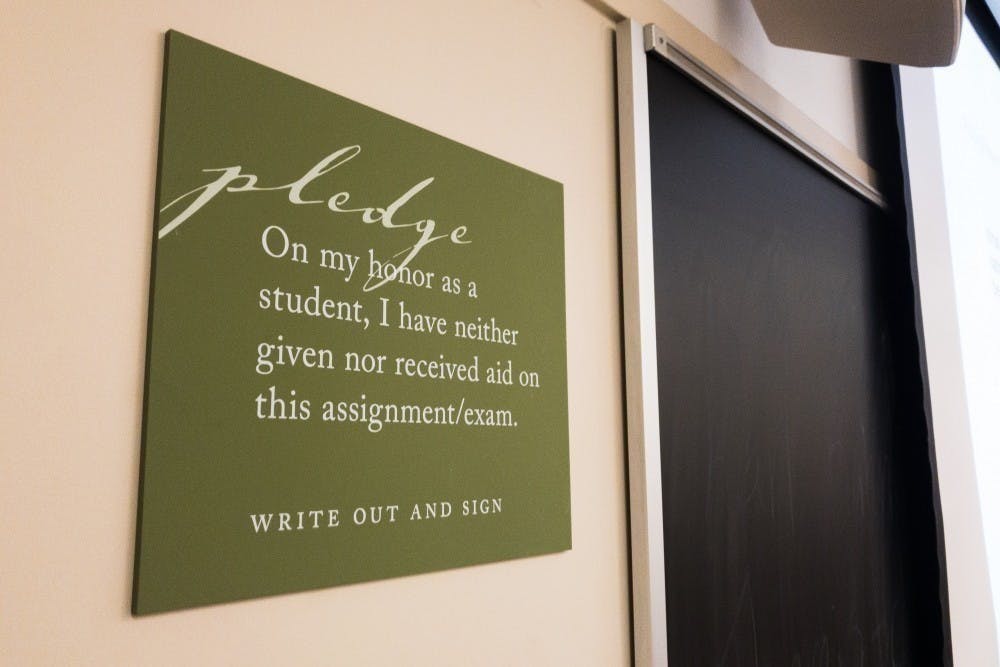The 2020-2021 Honor Committee met for the first time over Zoom Sunday. Discussions included plans for the coming year and case processing changes.
Over the weekend of April 5, third-year College student Ryan Keane was appointed to the Executive Committee as chair, along with third-year Engineering student Zainab Aziz as vice chair of investigations, third-year College student Andy Chambers as vice chair of hearings, third-year College student Madhav Nair as vice chair of education and third-year Curry student Isabelle Edwards as vice chair of community relations. They are succeeding fourth-year College student Lillie Lyon, fourth-year Engineering student Sally Greenberg, fourth-year College student Alex Spratley, fourth-year College student Mary Beth Barksdale and fourth-year Commerce student Lucy Krasker, respectively.
The meeting was largely focused on the start of the new term. In an interview with The Cavalier Daily, Keane emphasized that the meetings are still open to the public.
“People can reach out and anyone can get the Zoom link if they want,” Keane said.
The new Committee spent the meeting as an introduction and opportunity to discuss how the term will look. Keane noted that this included starting up the Policies and Procedures Sub-Committee and the Faculty and TA Advisory Committee.
The Sub-Committee on Policies and Procedures reviews Honor’s bylaws to recommend necessary changes, and the Faculty and TA Advisory Committee is meant to facilitate relationships between Honor and University faculty and TAs.
The Committee also discussed concerns about landlords threatening to report students who did not pay rent to Honor. Keane said in an interview with The Cavalier Daily that as long as the University remained closed, Honor would not be taking any cases regarding rent disputes. Honor plans to publish an official policy statement about rent charges on their COVID-19 response page in the upcoming days.
“We're still getting the final check through legal and everything, but once we get the all-clear we'll be updating the link,” Keane wrote in an email to The Cavalier Daily.
The investigation stage of case processing, during which it is decided whether the case will be dropped or moved on to trial, has resumed. Honor will not hold online trials and will instead postpone all official case decisions until the University resumes classes on-Grounds.
“Last week we officially resumed so all of the cases that were still in the investigation stage, those are moving forward,” Keane said. “The cases that were going to hearings are on hold, and we’re hoping to start right back up on time in the fall. We will be taking off for the summer like usual, and then just kind of wait and see what the fall brings.”
Keane also discussed his main goals for the term, which include reforming the Informed Retraction policy. IR allows a student who has been reported to Honor to avoid a trial and potential expulsion from the University by, as described on Honor’s website, “admitting such Offense to all affected parties and by taking a full two-semester Honor Leave of Absence from the University community.”
“My main goal, before [coronavirus] came up was really looking into the IR,” Keane said. “Because the IR really isn't very fair. International Students have a really tough time taking the IR because it basically takes away their VISA status. A lot of graduate students who are here doing research, if they take the IR they lose their research grant, so it sets them back a lot more than just one year. So we’re just kind of looking into the IR and seeing, ‘How can we fix this?’”
If a student is in the U.S. via a F-1 Visa — an endorsement on passports that allows students to stay in the U.S. for the specific purpose of obtaining an education from a given institution — a suspension would cause their Visa to be canceled. This means that international students who take an IR will likely have to leave the U.S. and apply for another F-1 Visa after their Honor Leave of Absence ends.
If a graduate student is receiving funding from a grant, they could likewise face an interruption of or end to that grant funding, depending on their field and the source of their grant money. In some cases, students might even need to repay their grants if they lose eligibility.
Keane also hopes to expand Honor’s outreach with the University community over the coming term.
“And I really just want to do a lot of sort of outreach,” Keane said. “Outreach to professors and students, just making sure Honor is a big part of our community.”
This article has been updated to correctly identify students' positions on the new Executive Committee.







